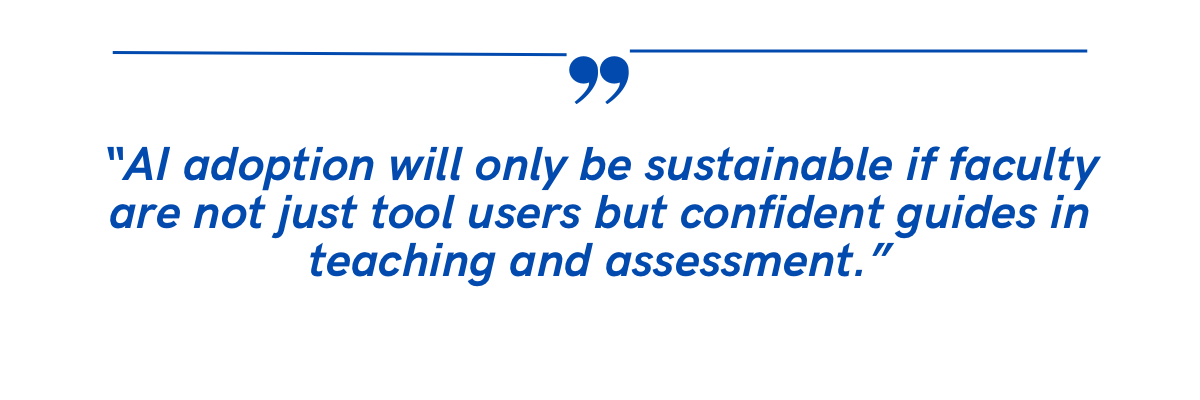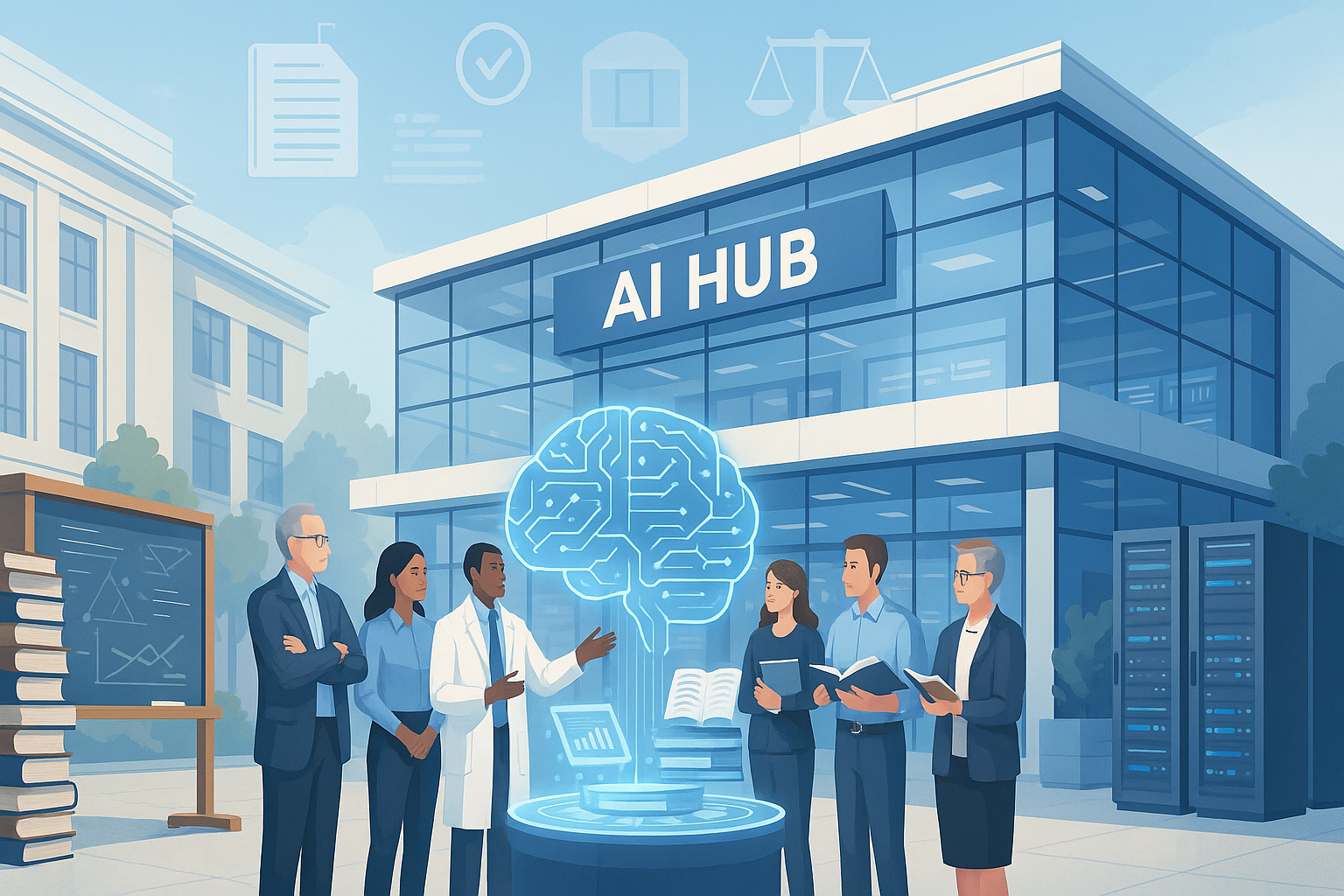This week, AI in higher education is dominated by two themes: institutional scale-ups of AI hubs, tools, and curricula, and faculty-focused training programs that build long-term literacy. Governance, ethics, and writing integrity policies continue to emerge worldwide, while universities pilot innovative ways of embedding AI into teaching, assessment, and student support.


Rice University’s AI Hub and Innovation Push
Summary
Rice University announced a new AI Hub to coordinate infrastructure, curricula, policy, and faculty training.
The initiative also introduces a Bachelor’s degree in AI, research infrastructure (GPU clusters, Google partnerships),
and a dedicated “Teaching with AI” faculty program
(Rice University, 2025).
The Details
- AI Hub centralizes strategy, policy, and support for faculty adoption
(Rice University, 2025). - Faculty learning communities will tailor AI by discipline.
- New B.S. in AI expands student pathways.
- Research boosted through GPU computing and access to Google AI tools.
- Faculty development includes an online course and “AI Teaching and Learning Week.”
Why it Matters
Rice’s strategy links infrastructure, policy, faculty development, and curricula into one framework. This comprehensive approach
positions Rice as a model for institutions seeking to avoid fragmented adoption, helping ensure AI enhances—rather than undermines—
learning quality
(Rice University, 2025).
AI Academy: Faculty Literacy Program (“Teaching the Teachers”)
Summary
A new study piloted the AI Academy, a generative AI literacy program for faculty, showing measurable improvements in AI knowledge,
confidence, and pedagogical reflection
(Chen et al., 2025).
The Details
- Engaged 25 faculty across disciplines using workshops, pre/post surveys, learning logs, and facilitator interviews
(Chen et al., 2025). - Participants gained skills in tool use, ethics, and policy awareness.
- Faculty reported increased capacity to adapt assessments and course design.
- The program provides replicable frameworks, instruments, and guidance for scaling.
Why it Matters
Faculty are pivotal to sustainable AI adoption. Structured literacy programs can shift practice, not just awareness—embedding ethics,
pedagogy, and reflection into real course decisions
(Chen et al., 2025).

Policy & Governance
-
Mandated AI Training in U.S. Law Schools
Turning legal education into AI fluency — U.S. law schools now require AI training in first-year programs, teaching students to analyze ethical and legal uses of AI
(Reuters, 2025). -
AI Disclaimers & Authorship Rules for PhDs in India
Transparency in doctoral work — India’s AICTE proposes that dissertations include AI-use disclaimers, limit AI contributions, and enforce authorship integrity
(Times of India, 2025). -
UNESCO Global Survey: Guidance Emerging
From chaos to framework — Two-thirds of higher ed institutions worldwide report having or developing AI policies, though faculty confidence remains uneven
(UNESCO, 2025).

Programs, Research & Infrastructure
-
UNSW rolls out ChatGPT Edu for all staff
Campus-wide access signals mainstreaming of AI tools — University of New South Wales provides institution-wide access to ChatGPT Edu for staff following internal trials that showed strong demand
(Australian Computer Society). -
Rice OpenStax pilots AI-supported peer tutoring
Scaling student help with AI-assisted study support — As part of its AI innovation push, Rice integrates OpenStax resources with AI tutoring pilots to enhance peer learning and feedback loops
(Rice University, 2025). -
UMB Faculty AI Studio Fellowship
Fellows design, test, and publish AI-enabled pedagogy — University of Maryland, Baltimore launches a faculty fellowship running through the academic year to prototype classroom uses and share findings openly
(University of Maryland, Baltimore, 2025). -
UNT Dallas builds an AI Community of Practice
Workshops and micro-credentials broaden faculty reach — A campuswide program reports high engagement, with training pathways that embed AI into teaching workflows and student services
(UNT Dallas, 2025). -
VR environments with AI mediation improve philosophy outcomes
Immersive methods boost engagement and exam performance — An instructional experiment pairing virtual environments with an AI mediator in first-year philosophy courses reports gains in engagement and achievement
(Vehrer & Palfalusi, 2025).

Other
-
Duke University’s AI Pilot and “DukeGPT”
Access meets security — Duke rolled out free ChatGPT-4o access for all students and faculty and launched “DukeGPT,” a secure sandboxed version to support controlled use while piloting new assessment approaches
(AP News, 2025). -
Google Pauses Chrome “Homework Help” Button
Integrity over convenience — After widespread backlash from educators, Google suspended testing of a Chrome browser feature that let students use Lens AI to auto-solve homework, raising questions about academic integrity and surveillance
(Washington Post, 2025). -
Grammarly Launches AI Writing Agents
Eight specialized assistants for student writing — Grammarly introduced new agent-based writing tools to guide sourcing, originality checking, rubric alignment, and drafting support, positioning itself as a curricular writing aid
(Grammarly, 2025). -
UConn Pilots AI in Economics Writing Curriculum
Embedding AI as a writing partner — The University of Connecticut is re-designing economics writing courses to train students in using AI tools effectively as co-writers and critical reviewers, tackling one of the largest majors on campus
(UConn Today, 2025). -
TigerGPT Boosts Campus Climate Surveys
Adaptive AI chatbot increases response quality — A faculty-designed chatbot at Princeton adapts climate survey questions empathetically, resulting in higher participation rates and richer student feedback
(arXiv, 2025).

Do It Now Checklist
Betting on faculty literacy & institutional strategy
The stories show that the most impactful progress comes where institutions align infrastructure with faculty development. Mandates, ethics policies, and institutional hubs are scaling AI adoption, but programs that train and empower faculty remain the decisive factor. Betting on faculty literacy & institutional strategy means prioritizing people over platforms to sustain meaningful AI transformation in higher education.
With Inspiration Moments, we share motivational nuggets to empower you to make meaningful choices for a more fulfilling future. This week, betting on platform-aligned faculty capacity means letting people, not products, drive change: invest in time, training, and clear guardrails so the tech serves learning.
Stay mindful, stay focused, and remember that every great change starts with a single step. So, keep thriving, understanding that “Life happens for you, not to you, to live your purpose.” Until next time.
Respectfully,
Lynn “Coach” Austin
References
All sources are hyperlinked in-text for immediate access to original publications.

